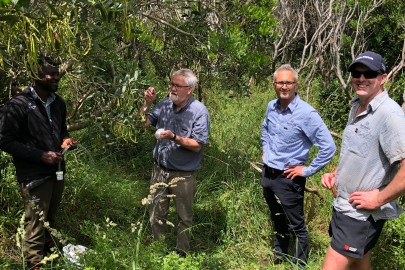A Wasp for a Weedy Wattle

Evans, Richard, Craig and Robbie (left to right) at the first release site
Sydney golden wattle is native to south-eastern Australia and was introduced to New Zealand for ornamental purposes and dune stabilisation. Each plant/small tree produces enormous quantities of seed that can stay viable for decades. Sydney golden wattle quickly spreads and invades disturbed and coastal areas, threatening our fragile dune and wetland ecosystems. It is now forming thick stands and outcompeting our native flora in Horowhenua, in the Kaimaumau swamps in Northland, and on Matakana Island. It is also becoming a problem in new pine plantations in the north.
Both South Africa and Portugal have also been severely impacted by Sydney golden wattle, and both countries have developed biocontrol programmes. This put us in a fortuitous position to consider the agents already released there. The programme in South Africa was initiated in the early 1980s with the release of two agents, the bud-galling wasp and a seed-feeding weevil (Melanterius ventralis). The bud-galling wasp is a tiny wasp (3–4 mm) that lays eggs inside the flower and vegetative buds of the plant, leading to the formation of large growths (called galls) in place of flowers and new shoots. This reduces seed production and growth. The programme in South Africa was highly successful, with reductions in seed production of more than 90%. This mitigated the economic and environmental impacts of the weed to such an extent that it is no longer a priority for control.
Portugal initiated a biocontrol programme for Sydney golden wattle in 2005, involving extensive host range testing on the gall wasp, which was approved for release in 2015. The wasp established quickly despite asynchronous seasons, with the wasp being introduced to the northern hemisphere from South Africa.
Our process to get approval to introduce biocontrol agents for Sydney golden wattle began in the early 2000s, when Research Associate Richard Hill conducted a feasibility study. In 2018 a new organism application to the EPA was in progress, and Richard initially wrote the application for both the bud-galling wasp and the seed-feeding weevil. However, surveys of the weed in New Zealand revealed a self-introduced seed-feeding weevil (believed to be Storeus albosignatus) that is expected to fulfil the role of the weevil introduced into South Africa along with the wasp.
Given the extensive research conducted on the gall wasp in South Africa and Portugal it was not necessary to undertake laboratory host range testing here. Instead, Richard conducted surveys of New Zealand native plants (such as kōwhai, Sophora spp.) closely related to Sydney golden wattle and growing in Australia in close proximity to Sydney golden wattle that had been visibly attacked by the bud-galling wasp. This provided additional supporting evidence that the wasp is highly host specific and no New Zealand natives are at risk of attack by the wasp.
An EPA application was finally submitted by Horizons Regional Council in June 2022. By November, plans were already in place to import a consignment of galls, hand-carried by our South African collaborator, Fiona Impson (University of Cape Town), despite still awaiting EPA approval. “This put us in a bit of a predicament over losing high numbers of adult wasps that emerged but could not yet be released. The adults are extremely short-lived, usually only surviving a few days, so we had to slow down development of larvae and pupae inside the galls by placing them in cool temperatures to delay adult emergence,” explained the technician on the project, Arnaud Cartier. When EPA approval was granted, we quickly transferred the galls to warm conditions, and 5 days later, Richard and project leader, Angela Bownes made the first releases of the wasp in Whanganui along with Horizons staff, Craig Davey, Evans Effah, and Robbie Sicely.
By mid-December we had released 201 wasps at two sites in Manawatū-Whanganui where Sydney golden wattle is a serious problem. While we are very hopeful the wasps will establish, we won’t waste any time trying to confirm the presence of galls when they should first be visible in May.
Funding
This project is funded by the National Biocontrol Collective and the Ministry for Primary Industries’ Sustainable Food, Fibre and Futures Fund (Grant #20095) on multi-weed biocontrol.
Key contact

